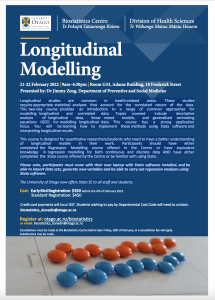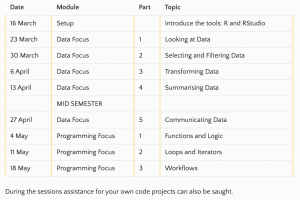Upcoming events hosted by or involving Genetics Otago will be listed here. Please check back regularly for updates. A calendar of events that may be of interest to our members can be found at the bottom of this page and in the sidebar of other pages on this site, please note that this includes events hosted outside of Genetics Otago.
Calendar of Events
The below is a calendar of events hosted by GO as well as events hosted by others that may be of interest to our members. If you have an event you would like us to include please contact us here.
Prof. Alex McLellan from the Department of Microbiology and Immunology (University of Otago) will present a seminar entitled “Genetically engineered lymphocytes for the treatment of solid cancers” at our Pathology Department Seminar Series on Friday 18th February 2022. The seminar will be held at the usual time of 1pm in the D’Ath Lecture theatre and accessible over zoom due to the Red Light settings.
Please contact the organisers for Zoom details.
For those attending in person, there will be refreshments provided at 12.45pm (~15 min before the seminar). Small packed lunches will be available- some sandwiches, choice of chips, popcorn, oaty bars and choice of packed beverages. Food will be kept for collection in the foyer near the back entrance of the D’Ath lecture theatre 😊 . We have a capacity for 50 people in the D’Ath.
Longitudinal studies are common in health-related areas. These studies require appropriate statistical analyses that account for the correlated nature of the data. This two-day course provides an introduction to a range of common approaches for modelling longitudinal and correlated data. Topics covered include descriptive analysis of longitudinal data, linear mixed models, and generalised estimating equations (GEE) for modelling longitudinal data. This course has a strong application focus. You will be learning how to implement these methods using Stata software and interpreting longitudinal results.
This course is designed for quantitative researchers/students who need to have a better understanding of longitudinal models in their work. Participants should have either completed the Regression Modelling course offered in the Centre or have equivalent knowledge in regression modelling for both continuous and discrete data AND have either completed the Stata course offered by the Centre or be familiar with using Stata.
Please note, participants must come with their own laptop with Stata software installed, and be able to import data sets, generate new variables and be able to carry out regression analyses using Stata software.
The University of Otago now offers Stata SE to all staff and students.
This Friday, March 4th Associate Professor Ben Wheeler from the Department of Women’s and Children’s Health (Dunedin) will be presenting the seminar titled “Technology for the management of Type 1 Diabetes – Past, Present, and Future”. Attached is the poster
The seminar will be held at the usual time of 1 pm over Zoom. Please see poster for Zoom details.
Small packed lunches will be available for collection in the ground floor tea room from 12:45 pm onwards.
Ben_Wheeler_poster
We look forward to seeing you on Friday!
Ngā Mihi,
Sunali & Jisha
Are you interested in mentorship as a mentor or mentee? On the 9th of March at 12-1pm the Early and Mid-Career Researchers (EMCR) Committee will be running its first professional development workshop of 2022.
The session is titled ‘Getting the most out of mentorship: Tips for Mentors and Mentees’. We would like to encourage all early and mid-career researchers to join us and learn more about this opportunity. The session will be run over zoom and our guest speaker is Suzy Keene.
Please contact the Organiser for Zoom link details.
STEM Women – Australia & New Zealand Careers Event
I wanted to invite your students to a free virtual careers event, focused on graduate roles and internships, based In Australia & New Zealand.
During the event, students will network live (chat, audio and video!) with graduate employers in different industries, hear insightful presentations from exhibiting companies and ask questions to a panel of women already working in STEM roles!
This event is targeted towards people who identify as female and are studying or recently graduated from, a STEM-related course at university. Students can also apply for graduate roles and internships within the event platform and have skipped interview stages through networking with graduate recruitment teams at our events, so this truly is a unique and exciting opportunity! We have a limited number of places for this free event.
R for Successful Student Projects is back again this semester starting 16th March. Across 9 sessions online, Wednesdays 10am-12pm, Murray Cadzow and Patricia Haden from the RTIS programming team will be teaching R, starting with an introduction to R syntax, through to using R with a focus on data, then onto how to use R programmatically. During each session, there will also be time to seek help and advice on how to use R for your own projects.
Staff are welcome to join in.
Please register your interest at https://rtis-training.github.io/r4ssp.
This Friday March 18th Dr Tania Slatter from the Department of Pathology (Dunedin) will be presenting the seminar titled “p53 Isoform Contributions to Brain Cancer”. Attached is the poster.
The seminar will be held at the usual time of 1 pm over Zoom.
Zoom Link:
https://otago.zoom.us/j/98905607169?pwd=N21NQ0FINnpIMHZUMng4Y0kzQ0FhUT09
Meeting ID: 989 0560 7169
Password: 566363
Small packed sandwiches, muffins and snacks will be available for collection in the ground floor tea room from 12:45 pm onwards.
We look forward to seeing you on Friday!
R for Successful Student Projects is back again this semester starting 16th March. Across 9 sessions online, Wednesdays 10am-12pm, Murray Cadzow and Patricia Haden from the RTIS programming team will be teaching R, starting with an introduction to R syntax, through to using R with a focus on data, then onto how to use R programmatically. During each session, there will also be time to seek help and advice on how to use R for your own projects.
Staff are welcome to join in.
Please register your interest at https://rtis-training.github.io/r4ssp.
R for Successful Student Projects is back again this semester starting 16th March. Across 9 sessions online, Wednesdays 10am-12pm, Murray Cadzow and Patricia Haden from the RTIS programming team will be teaching R, starting with an introduction to R syntax, through to using R with a focus on data, then onto how to use R programmatically. During each session, there will also be time to seek help and advice on how to use R for your own projects.
Staff are welcome to join in.
Please register your interest at https://rtis-training.github.io/r4ssp.
R for Successful Student Projects is back again this semester starting 16th March. Across 9 sessions online, Wednesdays 10am-12pm, Murray Cadzow and Patricia Haden from the RTIS programming team will be teaching R, starting with an introduction to R syntax, through to using R with a focus on data, then onto how to use R programmatically. During each session, there will also be time to seek help and advice on how to use R for your own projects.
Staff are welcome to join in.
Please register your interest at https://rtis-training.github.io/r4ssp.



